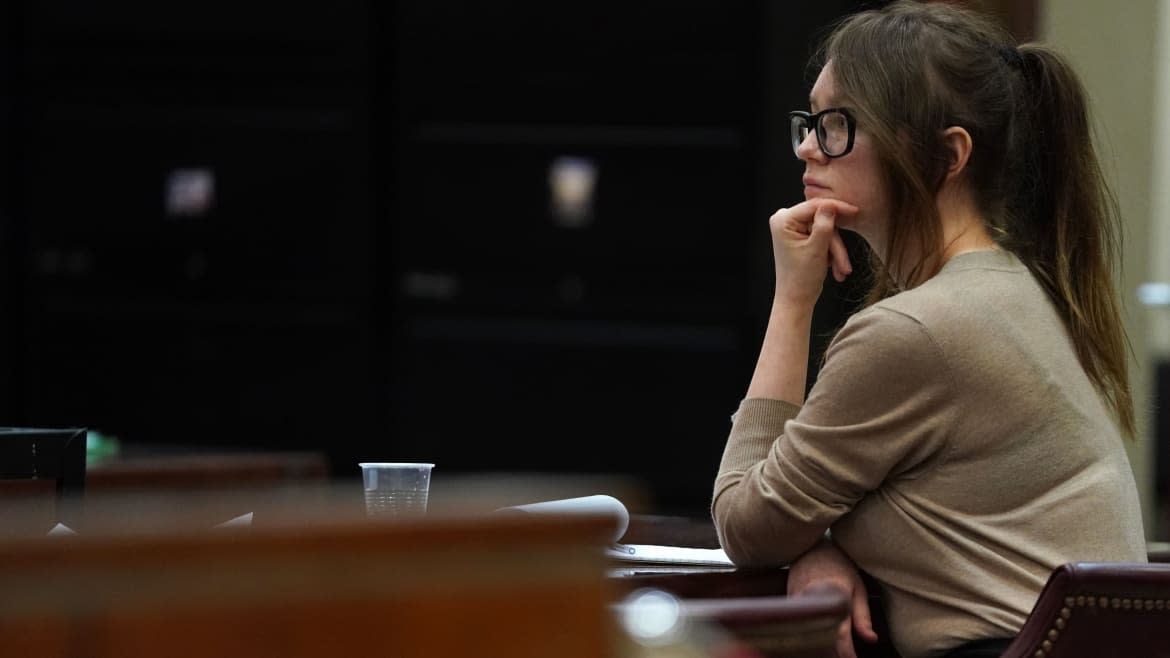Fake German Heiress Anna Sorokin Found Guilty in Fraud Trial

Anna Sorokin, the fake German heiress accused of swindling friends and businesses out of hundreds of thousands of dollars to bankroll her lavish Manhattan lifestyle, was found guilty on Thursday.
According to the New York Post, Sorokin was found guilty on eight counts— including first-degree attempted grand larceny. She reportedly faces 15 years behind bars and will be sentenced on May 9.
Known in New York’s social scene as Anna Delvey, Sorokin reinvented herself when she arrived in the United States from Germany in 2016, posing as a wealthy socialite when she was in fact the daughter of a Russian truck driver, prosecutors said.
After traveling the world and living in expensive boutique hotels, the 28-year-old was arrested in October 2017 and charged with grand larceny and theft of services for allegedly stealing about $275,000 in a 10-month spree.
During her three-week trial in Manhattan Supreme Court, Sorokin declined to take the stand on her behalf, and her attorney, Todd Spodek, didn’t put on a defense case.
The “SoHo grifter’s” case garnered national attention following New York Magazine and Vanity Fair articles last year that detailed the lengths Sorokin went through to convince close friends, banks, and financial institutions she was a foreign heiress with unlimited funds.
Manhattan prosecutors alleged Sorokin told “lie after lie” to maintain the lavish lifestyle she couldn’t afford, often providing forged financial records and bank statements to persuade others she had millions of euros overseas.
Sorokin, who told friends she’d moved to New York to start a private art club, lived out of hotels with an overdrawn account, dined at trendy restaurants without paying the tab, and even hired a personal trainer for $300 a session, prosecutors said.
“She knew if she told people she had this money, they would trust her, that eventually she would be good for the deal,” Manhattan Assistant District Attorney Catherine McCaw said in her closing arguments. “In fact, she had no ability to pay and no intention to pay.”
To prove Sorokin’s disregard for money, prosecutors detailed in court how she once spent $40,000 in just eight days. While staying at the W Hotel in Manhattan, she allegedly “barricaded herself” in her room and refused to let anyone inside, eventually spending $679 in miscellaneous expenses.
“That’s an awful lot of M&Ms,” McCaw said. “She knew she couldn’t pay for it.”
To fund her private art club, the 28-year-old allegedly created bogus bank statements while applying for a $22 million loan, creating a “team of imaginary assistants” in an effort to expand her credit line. Sorokin blamed this “team” when there were problems with wire transfers—at which point her plan begin to unravel, prosecutors said.
“All of the defendant’s wire transfers are merely a figment of her imagination,” McCaw said. “These are not white lies. These are lies that help you understand that the defendant, in fact, had criminal intent in this case.”
Prosecutors called more than two dozen witnesses to provide damning testimony against Sorokin, including Rachel Williams, a former friend whom she invited on a supposedly free trip to Morocco. Williams said she was forced to pay the $70,000 tab when Sorokin couldn’t cover the bill.
“I wish I had never met Anna. If I could go back in time and not be where I am today, you bet I would,” Williams, a former Vanity Fair photo editor and author of the 2018 article, said last week. “In hindsight, it’s easier to figure out the times where there were red flags. But at the time, I did not find it strange.”
The defense, however, argued that Sorokin was just living by the old adage “fake it till you make it,” like New York musician legend Frank Sinatra.
“Sinatra made a brand-new start of it in New York, just as Miss Sorokin did,” her lawyer, Todd Spodek, told jurors in court on Tuesday. She “was ambitious, she was persistent and she was determined to make her business a reality,” he said.
Admitting her lifestyle may have been “unethical and unorthodox,” Spodek insisted in his closing arguments that Sorokin was “enabled every step of the way by a system that favors people with money.” Though Sorokin did not speak, the trial was delayed several times over wardrobe concerns.
As previously reported by The Daily Beast, Sorokin hired former Glamour magazine editor Anastasia Walker to dress her for court appearances, a move her lawyer said was important since her style is a “driving force in her business, and life, and it is a part of who she is.” Her courtroom outfits have even inspired an Instagram account, Anna Delvey Court Looks, which has currently amassed over 3,000 followers.
“There’s a little bit of Anna in all of us,” Spodek concluded. “This is the life she chose to live.”
Got a tip? Send it to The Daily Beast here

